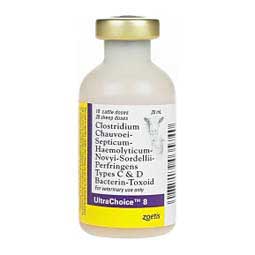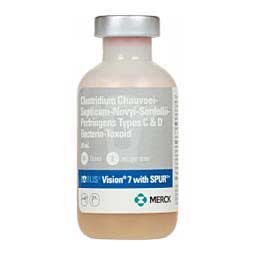
Vaccinating stock because of the risk of transmission of disease to humans. Scientists with the Agricultural Research Service ARS have developed a new experimental vaccine to protect cattle from the bacterium that causes Johnes disease Mycobacterium avium subsp.

In cattle the recombinant formulation was capable of inducing levels of 108 251 and 7 IUmL higher than the commercial vaccine against alpha beta and epsilon toxins respectively.
Alpha 7 cattle vaccine. ALPHA-7 is a single dose seven-way clostridium vaccine. ALPHA-7 is safe for use in all cattle. Formulated with DD-2 adjuvant a proprietary adjuvant system.
Alpha-7 Cattle Vaccine is a single dose seven-way clostridium vaccine used for healthy cattle including bred andor lactating cattle and dairy cattle. Alpha-7 bacterin-toxoid is recommended for the vaccination of healthy susceptible cattle including bred andor lactating beef and dairy cattle against disease caused by Clostridium chauvoei Cl. Perfringens Types C and D.
Immunity may be provided against the beta and epsilon toxins. Alpha-7 Cattle Vaccine is a single dose seven-way clostridium vaccine used for healthy cattle including bred andor lactating cattle and dairy cattle as an aid in preventing blackleg and overeating. The vaccination is formulated with DD-2 a proprietary adjuvant system oil to maximize the immune response and stimulate high levels of protection is safe for use in all cattle.
For vaccination of healthy susceptible cattle as an aid in the reduction of diseases caused by the Clostridial organisms listed on the center panel and for the prevention and control of pinkeye in healthy cattle caused by Moraxella bovis. Immunity may be provided against the beta and epsilon toxins elaborated by Clostridium perfringens type B. Alpha the only single-dose 7-way clostridial vaccines.
Low volume 2 ml dose. For use in lactating or non-lactating beef and dairy cattle. The rest of this Alpha-7 MB-1 vaccine focuses on seven different Clostridial diseases for which Ill use the common names.
Blackleg Malignant Edema Black Disease Gas Gangrene and. Boehringer Ingelheim Vetmedica Inc has USDA approval for the first single-dose 7-way blacklegpinkeye combination vaccine Alpha-7MB-1. It protects cattle against seven major Clostridia diseases and pinkeye.
A companion product Ocuguard MB-1 a single-dose pinkeye vaccine also received USDA approval. Clostridial vaccines often referred to as 7-way 8-way or 9-way vaccines are some of the most frequently used products in beef cattle production today. All clostridial vaccines are similar in that they are composed of antigens the vaccine version of the germ or portion of the germ or a toxic product of the germ the body.
The effects of injection of bovine vaccine into a human digit. There have been previous reports of injection of oil-based vaccines into the human hand resulting in granulomatous inflammation or sterile abscess and causing morbidity and tissue loss. Self-injection with veterinary vaccines is an occupational hazard for farmers and.
Alpha 7 aids in the prevention of blackleg disease caused by Clostridium Chauvoei Septicum Novyi Sordellii Perfringen Types C D Bacterin Toxoid in cattle and calves over 3 months of age. Administer 2 mL subcutaneously. GUARDIAN Neonatal Diarrhea Cattle Vaccine - 10 Dose.
Alpha-7 100mL - 50 Doses. Zoetis 579 - 2499. One Shot BVD Bovine Virus Diarrhea Vaccine - 10 Dose.
Bovi-Shield Gold One Shot - 5 Dose. Shown to be effective for the vaccination of healthy cattle 3 months of age or older against respiratory disease and abortion due to infectious bovine rhinotracheitis IBR respiratory disease and fetal infection including persistently infected calves due to bovine virus diarrhea virus BVD Types 1 and 2 bovine respiratory syncytial virus BRSV parainfluenza3 virus PI3 Mannheimia Haemolytica and Pasteurella. Currently the most commonly used clostridial vaccination in cattle is the 7-way type which protects against Clostridium chauveoi blackleg Clostridium septicum Clostridium sordelli malignant edema Clostridium novyi black disease and three types of Clostridium perfringens enterotoxemia.
Scientists Serve Up Vaccine Cocktail for Protecting Cattle from Disease. Scientists with the Agricultural Research Service ARS have developed a new experimental vaccine to protect cattle from the bacterium that causes Johnes disease Mycobacterium avium subsp. Recommended for vaccination of healthy susceptible cattle including bred andor lactating beef and dairy cattle.
Calves vaccinated under 3 months of age should be revaccinated at weaning or 4-6 months of age. Also great as an aid in the reduction of dise. The Boehringer Ingelheim Alpha-7MB-1 treats pinkeye against Moraxella bovis in cattle.
It provides greater immunity against 7 types of clostridial organisms and pinkeye. IT is formulated with chemically inactivated organisms with special DD-2TM adjuvant system to enhance immune response. One product Alpha 7 Boehringer Ingelheim only requires one dose but calves vaccinated under 3 months of age must be re-vaccinated at weaning or 4-6 months of age to be protective.
All blackleg vaccines recommend an annual booster. Do adult cattle need a blackleg vaccine. This is a common question with no definitive answer.
Long-acting viral vaccine that includes at least IBR and BVD and may include parainfluenza-3 virus PI3 and bovine respiratory syncytial virus BRSV Long-acting campylobacter fetus vibrioleptospirosis lepto vaccine. 7-way clostridial booster optional Other vaccines if necessary in your area. Bovilis vision 7 with spur Shown to be effective for the vaccination of healthy cattle and sheep against disease caused by Clostridium chauvoei Blackleg Cl.
Septicum Malignant edema Cl. Novyi Black disease Cl. Perfringens Types C and D Enterotoxemia.
However young calves sometimes develop clostridial infections enterotoxemia that are not resolved with commonly-used vaccines. Calves may succumb to acute toxic gut problems caused by Clostridium perfringens type A or E rather than C or D which are included in many 7 or 8-way clostricial vaccines. The calves or their dams have been vaccinated but calves are still dying.
In cattle the recombinant formulation was capable of inducing levels of 108 251 and 7 IUmL higher than the commercial vaccine against alpha beta and epsilon toxins respectively. Vaccinating stock because of the risk of transmission of disease to humans. Leptospirosis vaccine is available as a bivalent vaccine that protects against L.
Pomona or in combination with clostridial disease vaccine 7-in-1 vaccine. Vaccinating for leptospirosis Calves require two doses 4.